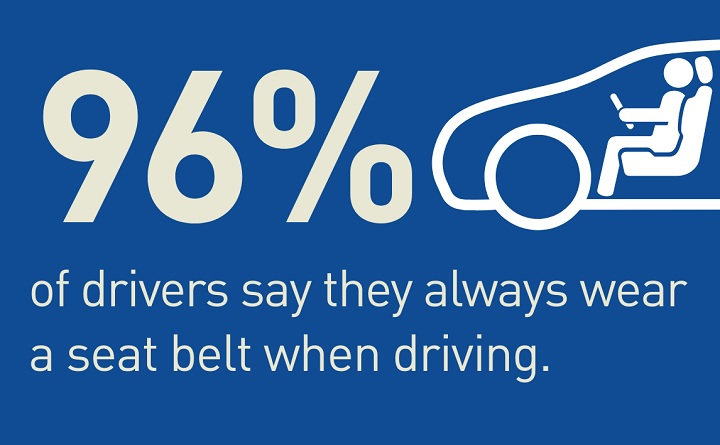
Image: Brake and AXA UK
More than 40% of car occupants who die in night time crashes on Britain’s roads are not wearing a seat belt, analysis of official data shows.
The analysis has been published by Brake and AXA UK, as part of a new report.
The report highlights concern for the ‘small but significant proportion’ of drivers who don’t wear a seat belt on every journey, ‘risking the safety of themselves, their passengers and other road users’.
A survey carried out by Brake and AXA UK shows that 96% of drivers say they always wear a seat belt.
However, data shows that a quarter of car occupants who die in crashes are not wearing a seat belt – a figure which rises to 41% for crashes that occur at night (6pm-8am).
Brake and AXA UK are challenging the government to implement the EU General Safety Regulation which stipulates that seat belt reminders should be made mandatory for all seats in all vehicles – with 10% of drivers saying they occasionally forget to buckle up.
The report also includes a recommendation for a review of the ‘archaic’ law that exempts taxi drivers from wearing a seat belt.
Last reviewed in 1993, the law was originally introduced to prevent passengers from using a seat belt to trap a taxi driver to their seat in order to steal their cash. Many taxis now have a Perspex divider separating drivers from their passengers, and fare payment is largely cashless.
While travelling in a taxi, around a fifth (21%) of those surveyed said they don’t always wear a seatbelt, even though it is a legal requirement to wear one if available.
Brake and AXA UK are also calling for a new public awareness and education campaign to highlight the safety benefits of belting up on every single journey, with a specific focus on driving at night.
Ross Moorlock, CEO at Brake, said: “From 2018 to 2022, more than 3,000 car occupants have died and 44,000 have suffered serious injuries. It’s reasonable to assume, therefore, that during this time period, more than 11,000 people may perhaps have been able to protect themselves against traumatic brain injuries, neck and spinal injury, and damage to internal organs.
“Seat belts are one of the simplest and most effective ways to protect ourselves when travelling by car, yet some still choose to risk their own safety – and the safety of those travelling with them – by choosing not to belt up.
“We believe it is always safer to wear a seat belt than sometimes wear one. Whatever the length of your journey, and regardless of whether you are carrying passengers, we urge you to belt up for every single journey.”
Comment on this story